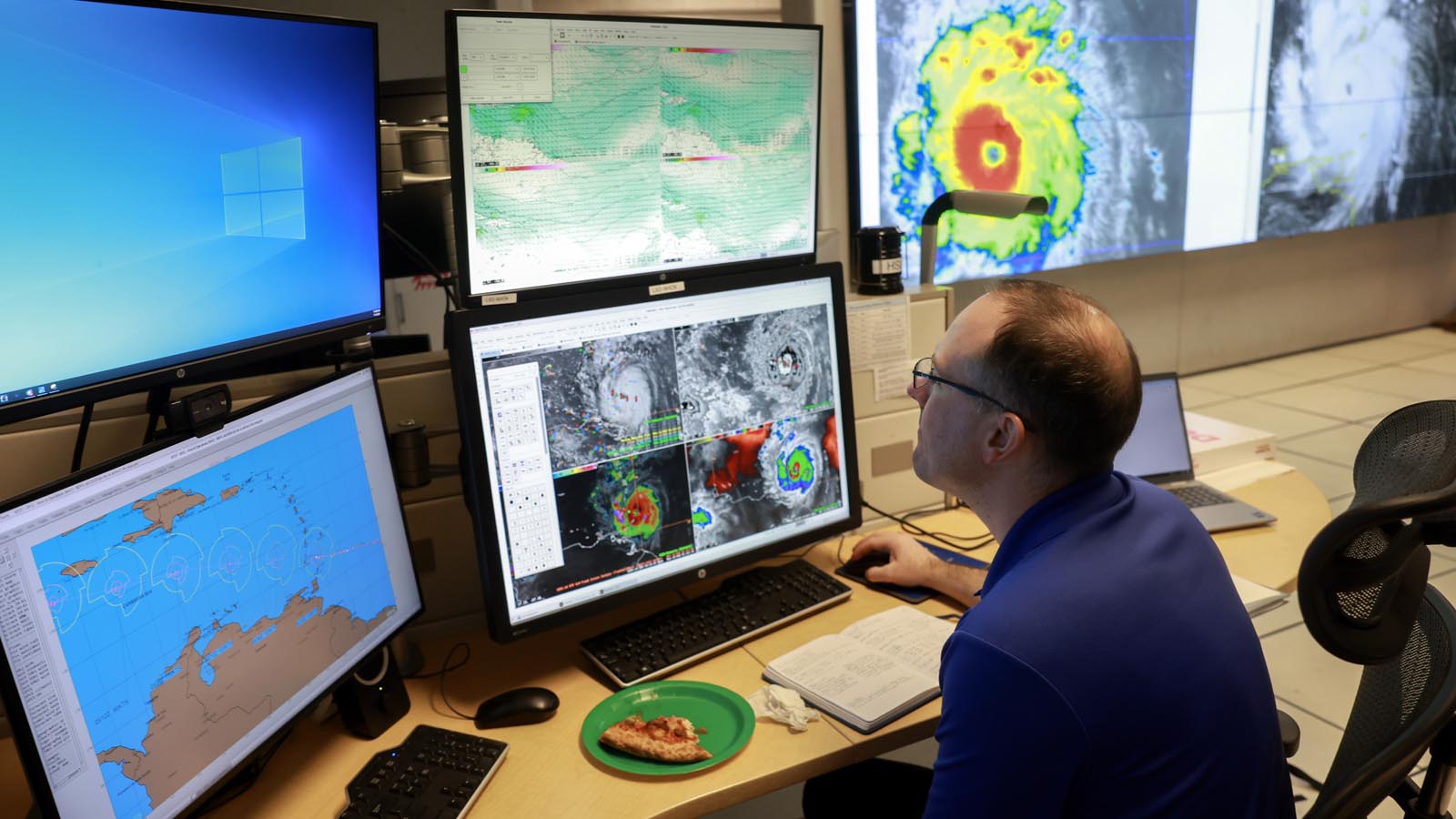Which Hurricane Track Models Are Most Accurate In 2025?

Welcome to your ultimate source for breaking news, trending updates, and in-depth stories from around the world. Whether it's politics, technology, entertainment, sports, or lifestyle, we bring you real-time updates that keep you informed and ahead of the curve.
Our team works tirelessly to ensure you never miss a moment. From the latest developments in global events to the most talked-about topics on social media, our news platform is designed to deliver accurate and timely information, all in one place.
Stay in the know and join thousands of readers who trust us for reliable, up-to-date content. Explore our expertly curated articles and dive deeper into the stories that matter to you. Visit Best Website now and be part of the conversation. Don't miss out on the headlines that shape our world!
Table of Contents
Which Hurricane Track Models Are Most Accurate in 2025? Navigating the Uncertainty
Hurricane season is a time of anxiety for millions living along coastal regions. The swirling chaos of a major hurricane brings with it the urgent need for accurate forecasting. But with so many different hurricane track models available, which ones can we trust the most in 2025? The answer, unfortunately, isn't straightforward. Accuracy varies depending on several factors, including the specific storm, its location, and the time frame of the prediction.
However, understanding the strengths and weaknesses of different models is crucial for effective preparedness. This article will delve into the leading hurricane track models, examining their historical performance and highlighting their strengths and limitations as we head into the 2025 hurricane season.
The Key Players in Hurricane Forecasting:
Several agencies and institutions worldwide contribute to hurricane track prediction, each with its unique modeling approach. The most prominent include:
-
The National Hurricane Center (NHC): The NHC, part of the National Oceanic and Atmospheric Administration (NOAA), is the primary source of hurricane information for the United States. They utilize an ensemble of models, meaning they combine the outputs of several different models to arrive at a consensus forecast. This approach helps mitigate the inherent uncertainties in individual models. Their forecasts are considered the gold standard for the Atlantic basin.
-
The Global Forecast System (GFS): Developed by NOAA's National Centers for Environmental Prediction (NCEP), the GFS is a global weather prediction model that provides critical data for hurricane track forecasting. Its high resolution and comprehensive data assimilation make it a valuable tool for predicting hurricane paths, particularly in the longer term.
-
The European Centre for Medium-Range Weather Forecasts (ECMWF): Often considered the most accurate global weather prediction model, the ECMWF's model consistently demonstrates high accuracy in predicting hurricane tracks, particularly in the early stages of development. Its superior performance is often attributed to its advanced data assimilation techniques and higher resolution.
-
The Hurricane Weather Research and Forecasting (HWRF) model: This model specifically designed for hurricane prediction, combining high-resolution data with sophisticated physics to simulate hurricane behavior. It's frequently used in conjunction with other models to refine forecasts.
Understanding the Limitations:
While these models are incredibly sophisticated, it's crucial to remember their limitations:
-
Model Uncertainty: All models are inherently imperfect. They rely on approximations and simplifications of complex atmospheric processes. The further into the future a prediction is made, the larger the margin of error becomes. This is why NHC forecasts become less precise as the prediction horizon extends.
-
Data Availability: The accuracy of hurricane track models depends heavily on the quality and availability of input data. Data scarcity over certain ocean regions can limit predictive accuracy.
-
Rapid Intensification: Sudden and unexpected increases in a hurricane's intensity (rapid intensification) remain a significant challenge for forecasters. These events can dramatically alter the storm's track and are difficult to predict reliably.
Improving Accuracy:
Ongoing research and technological advancements continuously improve hurricane track prediction. Researchers are focusing on:
- Improved Data Assimilation: Incorporating more data sources, such as satellite observations and in-situ measurements, to refine model inputs.
- Advanced Numerical Techniques: Developing more sophisticated numerical methods to better simulate atmospheric processes.
- Ensemble Forecasting: Expanding the use of ensemble forecasting techniques to better quantify model uncertainty and provide a more comprehensive range of potential outcomes.
Conclusion:
Determining the single "most accurate" hurricane track model in 2025 is impossible. The best approach is to consider the consensus of multiple models, paying close attention to the NHC's official forecast and understanding the inherent uncertainties involved. Staying informed through reputable sources like the NHC website and following official weather advisories is the best way to prepare for the 2025 hurricane season. Remember, preparation is key; don't wait until a hurricane is imminent to take action. Develop a hurricane preparedness plan now to protect yourself and your family.

Thank you for visiting our website, your trusted source for the latest updates and in-depth coverage on Which Hurricane Track Models Are Most Accurate In 2025?. We're committed to keeping you informed with timely and accurate information to meet your curiosity and needs.
If you have any questions, suggestions, or feedback, we'd love to hear from you. Your insights are valuable to us and help us improve to serve you better. Feel free to reach out through our contact page.
Don't forget to bookmark our website and check back regularly for the latest headlines and trending topics. See you next time, and thank you for being part of our growing community!
Featured Posts
-
 Understanding The Dangers Of Legal Nitrous Oxide In America
May 29, 2025
Understanding The Dangers Of Legal Nitrous Oxide In America
May 29, 2025 -
 Washington Dc Weather Alert Heavy Rain And Potential Flooding
May 29, 2025
Washington Dc Weather Alert Heavy Rain And Potential Flooding
May 29, 2025 -
 England And West Indies Clash In First Odi Live Score And Commentary
May 29, 2025
England And West Indies Clash In First Odi Live Score And Commentary
May 29, 2025 -
 Big Beautiful Bill In Jeopardy Senate Democrats Power Play
May 29, 2025
Big Beautiful Bill In Jeopardy Senate Democrats Power Play
May 29, 2025 -
 Major Blast Devastates Chinese Chemical Plant Authorities Launch Urgent Rescue Effort
May 29, 2025
Major Blast Devastates Chinese Chemical Plant Authorities Launch Urgent Rescue Effort
May 29, 2025
Latest Posts
-
 Deodorant Recall Alert 67 000 Units Recalled Across Walmart Dollar Tree Amazon
Jul 17, 2025
Deodorant Recall Alert 67 000 Units Recalled Across Walmart Dollar Tree Amazon
Jul 17, 2025 -
 Life After Love Island Usa Amaya And Bryans Relationship Update
Jul 17, 2025
Life After Love Island Usa Amaya And Bryans Relationship Update
Jul 17, 2025 -
 September 2025 Ynw Melly Faces Retrial In Double Homicide Case
Jul 17, 2025
September 2025 Ynw Melly Faces Retrial In Double Homicide Case
Jul 17, 2025 -
 Love Island Usas Amaya And Bryan Building A Future Beyond The Villa
Jul 17, 2025
Love Island Usas Amaya And Bryan Building A Future Beyond The Villa
Jul 17, 2025 -
 September Retrial For Ynw Melly On Murder Charges After Jury Fails To Reach Verdict
Jul 17, 2025
September Retrial For Ynw Melly On Murder Charges After Jury Fails To Reach Verdict
Jul 17, 2025
